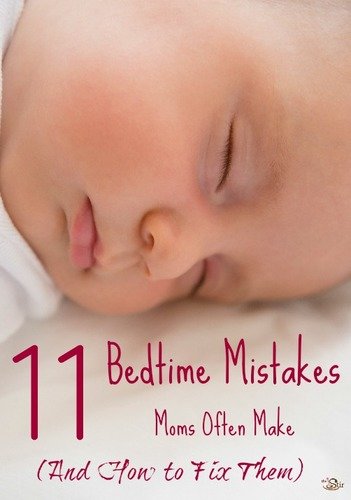Do you ever look at your baby and think, "You'd be absolutely perfect if you'd just go to SLEEP"? Don't feel guilty! Been there. Done that. Baby sleep — or the lack thereof — may be the great equalizer among parents rich, poor, and middle class. None of us really understands it, but we're all desperate for the secret to getting our babies to sleep, safely, through the night. So why isn't it happening? Well … maybe because of us! We turned to baby sleep experts to find out what parents commonly do wrong when it comes to baby's bedtime.
1. Expecting infants to sleep through the night. This isn't a "mistake" so much as a "misperception," says Dr. Stephen H. Sheldon, DO, FAAP, a member of the National Sleep Foundation board of directors. "It's a misperception that babies can sleep like adults," says Dr. Sheldon. "Adults can sleep like a baby, but a baby can't sleep like an adult! It's like asking a 6-month-old to go to the grocery store and get you a gallon of milk!" According to Dr. Sheldon, it isn't until a baby is between 8 and 12 weeks that their longest sleep period will be at night, their longest wake period during the day. Expecting it earlier is just putting too much pressure on a baby!
2. Using a drop-side crib. Joyce Davis, the president of non-profit Keeping Babies Safe, is surprised how many parents don't realize new federal standards went into place for cribs in 2011 — and aren't following the new law. "Drop side cribs do not meet the new standard and are therefore banned from the marketplace," Davis explained. "Cribs prior to this date are mostly deemed unsafe, and when in doubt, parents should purchase a new crib." Davis also recommends parents check their crib regularly for loose or missing parts, and check any crib they're using in a hotel or motel as these establishments should be following the regulations (but might not be). If you can't afford a new crib, Keeping Babies Safe can help get you a safe one.
3. Using a supplemental mattress in a play yard. Davis founded Keeping Babies Safe after her own son died during the use of a supplemental mattress that she says was advertised as suitable and safe for a play yard. Since then, she's been on a mission to prevent other parents from dealing with this same devastating loss. Says Davis, "Parents should only use the mattress provided by the manufacturer that is sold with the play yard. Most parents feel that the hard, thin play yard mattress is not comfortable for the baby, but this is not the case. Most injuries and deaths occur due to supplemental mattresses in the play yard. NEVER purchase this product for the play yard."
More from CafeMom: 17 Weird Tricks to Get Baby to Sleep That Moms Swear By
4. Ignoring the bedtime routine. Even with infants, you need to be consistent, says Dr. Wendy Sue Swanson, board-certified pediatrician and author of MAMA DOC MEDICINE: Finding Calm and Confidence in Parenting, Child Health, and Work-Life Balance. "However basic it sounds, consistency is the secret sauce in sleep training and sleep support," says Dr. Swanson. "Make a plan and do your best to support each other doing the same thing from one night to the next."
5. Putting baby to bed with a bottle. Sure, your parents did it with you, but that doesn't mean it's right! "In general you want to establish great sleep associations for your baby," explains Dr. Swanson, who also writes the Mama Doc blog for the Seattle Children's Hospital. "That means you want to avoid having a baby’s dependency on feeding to drift off to sleep. In addition, we never want infants self-feeding with a bottle to bed. Not only do we worry about choking, we know that having a bottle in bed with a baby significantly elevates the risk for cavities as toddlers!" Tired of getting up to feed the baby at night and hoping the bottle will help? Well, according to Dr. Swanson, babies rarely need to eat at night after 9 months of age anyway, so skip the bottle!
6. Getting babies 3 months and older to sleep before putting them to bed. It's tempting to rock a baby to sleep before putting them in the crib, but Dr. Sheldon, who is also a professor of Pediatrics and Neurology Northwestern University Feinberg School of Medicine and director of the Sleep Medicine Center Ann and Robert H. Lurie Children's Hospital of Chicago, warns against it. "Babies should be put down awake; they may be drowsy, but awake," he said. "If they learn to fall asleep under circumstances that are not there when they wake up in the middle of the night, they won't be able to self-soothe themselves back to sleep." Dr. Sheldon advises parents to think of rocking or cuddling a baby to sleep the way they do their own pillow or blanket. If you wake in the middle of the night and your pillow is gone, you won't be able to go back to sleep until you find it. The same goes for a baby; only where an adult will simply get up and find that pillow, then settle back to sleep, a baby won't be able to go "find" that state of being rocked or cuddled and will end up crying.
7. Using blankets, crib bumpers, etc. You're bound to get a lot of cute stuffed animals and blankets at your baby shower, but Dr. Swanson says save them for when baby's older — at least 6 months or even older. "I want parents to feel that they’ve created the safest sleeping arrangement they can; we should all feel we’ve done everything we can," Dr. Swanson says. "That means bare and boring! The ideal sleeping environment for a new baby is on their back in a bare crib (no bumpers, pillows, loose blankets, stuffed animals, etc.) in their parents’ bedroom." Got that? Just because they're sold in the stores doesn't mean you should use them!
More from CafeMom: The Biggest Baby Sleep Mistake You're Probably Making Right Now
8. Allowing newborns to sleep in a car seat. Most babies will fall asleep on a car ride, but Dr. Sheldon warns that this can be a problem for the youngest babies who don't have control over their necks. Although rare, what's known as "neck flexion" can occur, in which a baby's head falls forward, and their chin is on the chest. This can obstruct a baby's breathing. For that reason, the doctor warns that parents should stick to putting newborns to sleep in a crib or bassinet.
9. Following the "never wake a sleeping baby" rule. You've probably heard it time and again, but Dr. Sheldon says not to believe it. "Never say never," he says. "There is no hard and fast rule." If your older baby (between 6 months and a year) is waking extra early, you may have to adjust their circadian rhythms, which means holding off bedtime by a few minutes at night — waking them when they really want to go to sleep. And while most babies will wake themselves when they're hungry, Dr. Swanson warns that during the first two weeks of life, babies may try to sleep through feedings. "If they have prolonged naps that span more than 3 hours, they miss a feed and miss gaining the weight they do. During this time, I recommend waking the sleeping baby," she says.
10. Letting babies get "overtired." If a baby is wound up, they're not ready for bed, right? Wrong! "Some children show fatigue not by yawning but by getting hyper and a bit wild," warns Dr. Swanson. "Learn to follow your babies’ cues for fatigue and get them to bed prior to their fatigue winding them up tight like a top."
11. Listening to too much outside advice. Feeling overwhelmed? That could be because you're listening to other people instead of your gut. "Stop listening to Grandma and Grandpa who say you should be doing this thing and don't do that thing. Stop listening to friends who say their baby is sleeping through the night from day one," says Dr. Sheldon. "In otherwise normal children, parents are really not doing the wrong thing!"





